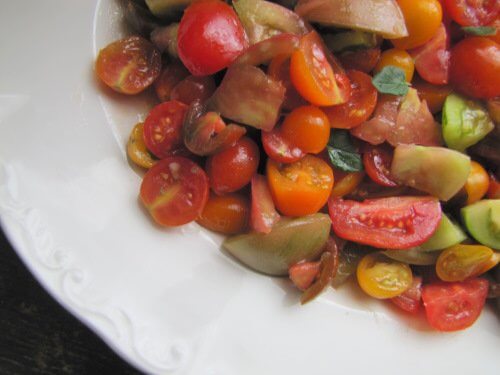Raising healthy eaters- Feeding picky toddlers
Feeding toddlers can be a bit tricky, can’t it? They’re starving one minute, then they pick at their food the next. They love peaches and broccoli and chicken and rice and anything else that you offer them one week, and then the next week they don’t want to eat anything but oatmeal with raisins and milk, morning, noon and night.
What is a health-conscious mom to do?
Today, I want to talk about shaping young tastes. I’m sorry, but this isn’t the post where I tell you how to make smiley faces out of their veggies and sneaking spinach into their brownies.
I will definitely get to the issue of how to creatively and nutritiously get food into our toddlers, and even ways to make it more fun and interesting for them, as I believe that it is important for them to enjoy their food, and that enjoyment helps them to develop lifelong patterns of choosing to eat foods that are good for them. So stay tuned, because the recipes and ideas are certainly coming (although be forewarned that although I am all for creative cooking, I do not endorse deception as a method of getting healthy foods into our children)!
However, today I want to discuss the ways that we, as the parents, shape the tastes of our precious youngsters, because I believe that it is one of the most important aspects of raising healthy eaters.
Who’s the parent?
Now, I am stepping out on a limb here, knowing that I may offend and get a few people’s backs up a bit. But I think that what I have to say here is really, really crucial. Here it is…
When it comes to feeding your children and dealing with pickiness, the bottom line is that you are the parent, and they are not. You are the authority, and their role is to learn to respond to you with complete obedience. End of story.
I have worked with a lot of preschoolers and their families, before I was married and had my own children, and what I saw was an awful lot of parents who were allowing their children to dictate to them what they would and would not eat. I knew children who would only eat macaroni and cheese and ketchup and rice crackers and cheerios, and would only drink pop and milk (not even water!), and that was it! Honestly, it was ridiculous, and it is a wonder that those children were even as healthy as they were (although their parents could not yet see the long term health, as well as intellectual and behavioral outcomes of that kind of a diet).
Although those kind of cases are extreme, I still see the same thing happening in many families, to a lesser degree. Children are allowed to be picky. They are not told, either in words or consequences, that pickiness is not acceptable. If we were to ask our grandparents about what they ate when they were children, they would likely tell us that they ate whatever was put in front of them, because they obeyed their parents (because they were trained to obey them) and because food was often scarce and they were grateful for whatever they had.
What is so different nowadays? For one thing, we have such an over-abundance of food, much of which is not even nourishing in the slightest, that we often do not even recognize how blessed we are to even have food on the table at all. All food that we have is a gift and a blessing. There is a song I love that we sing at church, and one line says “anything we harvest is a gift from Your hands”.
Are we, as parents, modeling thankfulness for the blessing of an abundance of food for our children? As I prepare food with my daughter and son nearby, and as we eat our meals together, we try to talk about how good the food is, how God provided it for us, how He created these foods to make our bodies healthy, and how we should thank Him for it.
Additionally, we are not training our children to eat what is put before them. As Christian parents, most of us recognize that God has given us authority to teach and train our children to obedience, and this applies to attitude, behaviors, manners, words, looks, respect for property and for other people, etc. I would suggest that this training must also happen at the dinner table, when we set a plate of food before our children.
Now, I am not advocating that we force our children to eat when they are not hungry anymore (in fact, this is not even a healthy practice, as it teaches us to disregard our body’s signals that we are full and we learn to overeat), or to eat great quantities of food that they strongly dislike.
However, in our home, everything must be at least tried, and we usually enforce that “trying” equals taking more than one teensy, tiny bite. It entails several decent sized bites, enough to really taste the full flavor of the food. If our daughter decides that she still does not like a food at this point (after 3-4 bites), we will allow her to leave it and eat the rest of her food.
Furthermore, that is not the end of that food. We will continue to offer it every time it is prepared as part of the meal. I do not avoid particular foods because of my child’s preference (although I do avoid some foods based on my husband’s preference, but that is an entirely different thing!). For example, my daughter currently has decided that she doesn’t really care for tomatoes, onions or red peppers (which is unfortunate for her, as these are very common food in our house!).
So what do I do about it? First of all, I still use them freely in my cooking. And, I allow her to help and to watch me cook, so she is involved in the process and more interested in eating the final result because she has had a role to play in it (I will probably spend an entire post talking about including our children in our food choices and preparation).
Second, she is required to try some of these foods each and every time I make them. And increasingly, we are requiring her to eat more than just a few bites, and more recently, the entire amount that she has been served. Just as a side note, I try to keep her servings very reasonable in size, even slightly on the smaller side, so that we can enforce that she eat what she has been given, and then if she is still hungry, she can have more of her favorites.
Third, I am training her through my words (and my husband’s, at dinnertime) to like these foods that she believes that she dislikes. I grew up “disliking” many foods, and was an incredibly picky eater by the time I was an adult. I decided to begin re-training my taste buds while I was in university, by slowly adding a few new foods (mostly vegetables and fruits) into my diet every couple of months, until I learned to like the taste of them. And you know what? It worked!!! The little girl (gosh, even the 19 year old!), that used to eat only carrots, corn, potatoes, tomato sauce and iceberg lettuce, now eats a very full array of vegetables (not to mention most fruits and other foods as well). The key word here is “train”!
Training and shaping our children’s tastes
So how do we train their likes and dislikes? When Abbie is eating healthy foods, especially vegetables and fruits, but also slightly different foods, such as quinoa or millet, real yogurt with no sweetener, molasses, etc. I will sing the praises of those foods! For instance, “Abbie, did you know that God made peppers to keep your body healthy? They are so good for you, and they’re delicious- they’re one of Mommy’s favorite vegetables!”. Or “Wow, isn’t this quinoa good? Wasn’t it kind of God to create such yummy and healthy foods for us to eat? What do you think, Daddy?”
When she tells us that she doesn’t like something, I will calmly say, “Well, God gave us _____ to keep us healthy and to help our bodies grow strong. We should thank Him for it, shouldn’t we? I’m glad that you’re trying _____ and that you are learning to like it.” A common phrase from my daughter at dinner these days is “Mommy, I think I’m learning to like tomatoes (or peppers or lettuce or whatever it is we’re working on at the time)”. When she finishes eating her meal, and has eaten all of the foods that we specifically asked her to eat, we try to make a point of letting her know that we are proud of her for choosing to eat her food, and for having such a happy heart about it (because obeying is not complete with a sour attitude- obedience is completely, right away and with a happy heart!).
Lest you think that our training efforts are perfect, I will let you know that we have the occasional dinner where there is a minor meltdown, or where those 3 pieces of pepper that she was given are the last thing standing on her dinner plate, and they’re not going down without a fight. This is ok. She’s sinful, just like me. We just deal with it as with any other disobedience, require her to do as we have asked, and move on.
Some of you may be thinking, “It’s great that you started training your children young, but mine are 7 (or 10 or 13) and I don’t know how to change their tastes at this point”. This is a very valid question.
To answer in a nutshell, I would say that you apologize to your children for not having trained them correctly in this area (a humbling but necessary step), and let them know that things will now be changing around your house. From this point on, they will be required to eat a little bit of everything that is served, and they will do so with a cheerful attitude, and that the entire family will be making some healthier choices, together!
Parents, you will need to strongly model this for your children, if part of their pickiness comes from watching you avoid many of the foods that you know that you should eat. It may take some time, as you cannot change these kind of things overnight. But if you are consistent, and persistent, I believe that you can gradually re-train your children’s tastes the same way that I re-trained mine.
It’s so worth it…
In the long run, to have children who will obediently eat what they are asked to eat, and for them to have healthy tastes that have been molded by you, the family “nutritionist” 🙂 For those with young children, like myself, be diligent in these early years and you will reap the rewards! I can already see it starting to show in my daughter- she doesn’t request candy or pop or chips (well, she does share her parent’s affinity for ice cream, but it’s still a pretty rare treat)- this girl wants dried fruit and nuts/seeds and yogurt and apples and smoothies and even asks if she can have some salad at dinner- Yippee!
More Kitchen Tips at Tammy’s Recipes!







I couldn’t agree more! My husband grew up in a home that allowed him to become an extremely picky eater. He’s definitely doing better now, but that is not something I want for our 9 month old daughter. I think that not allowing our children to be picky eaters will allow them to have more open hearts to whatever God calls them to do. For instance, if God calls my daughter to serve in China, I don’t want her to disobey or hesitate because she really dislikes Chinese food. So I think that teaching children to appreciate all different kinds of foods is not only healthy, but it fosters obedience in many areas of life.
Great post and I couldn’t agree more!
You’ve just put into words what we’ve been doing in our home. The short-term ‘pain’ of training your child to eat what mommy cooks for them will reap long-term ‘gain’. I especially notice this when we eat a meal with another family at their home. My children (generally) eat what is placed before them.
Great post and great suggestions.
We have 3 kids (4, 2 and 7 months). I have always served the older two whatever the rest of the family is eating. And, while my 4 year old has an adventurous palate, like his daddy, our 2 year old is fairly picky. We have not figured out how to make him take a bite without forcing it in his mouth. He will sometimes put something in his mouth and then spit it out. And we do use the rule that you have to take a bite of everything on your plate. My husband and I are getting very discouraged with trying to get him to eat.
I found out that a lot of toddlers get picky as a natural resonse to new food. This is to protect them from eating poisonous things. This helped me a lot, when serving new food to show them that it was fine to eat by eating it myself. Also it encouraged me to feed my children a wide variety of food during weaning.
I can’t agree with you more about the blessing of having children who are willing to try new things and eat healthy food well. People are amazed at the food and tastes my girls enjoy. It really is worth the effort. And it is skill that will stay with them throughout life.
Thanks for this post, Stephanie. It’s something that pretty much every parent comes against.
I think it’s a hard balance to make sometimes. Here’s my story.
I do think that it is very true that young children’s taste buds are very sensitive. I remember there were certain things that I could hardly eat when I was young. Sour cream tasted extremely tart and disgusting (I hated it-
though I love it now), tomatoes were very strong, bell peppers were also extremely strong to me, though now I think they are sweet! Spinach, cooked, I really couldn’t swallow because it would make me gag so much. All to say, I think that children’s adverse reactions to food are very real, and not necessarily something one can always overcome with mere obedience and repetition.
But on the other hand, I think that what my mother did was good. She was always having us try new things, and we always had to have at least a few bites. She didn’t feed us our least favorite thing everyday, but would have it on the menu occasionally. It worked great for me. I turned from a very picky eater to one who always likes to eat new things! So keep up the good work of having your children try new things, I bet it will pay off for you and your children. 🙂
On the other side, I had a friend who’s father would make him eat something he didn’t like once a week for 6 weeks. It didn’t work for him but only made me HATE the food with a passion. An example of forcing food gone bad. I think my mother’s way was better. Introduce foods, but not force it all down.
Like I said, I think there is a balance there.
One in which I am just beginning to learn myself with my daughter Elena. 🙂
Excellent post! Both me & my husband are picky and I need the encouragement to re-train our taste buds, especially before we have kids to follow our examples! Thank you.
I have an 18 month old son. I cannot get him to eat what we are eating. If it is not from a short list of things, he won’t eat it. I have just now gotten him to eat a few of his old favorites that he gave up. I did this through a retraining technique. However, dinner time is a fight because I serve him what we are eating. Last night we had baked chicken peas and mashed potatoes. He would not touch any of it. In fact, I am in the process of retraining him not to throw his food. I know a child will not starve themselves to death, they will eat. But how do I get him to eat something when he will not even try? By the way, I am sneaking vitamins in where ever I can put them…yogurt and vitamins in his milk, ground flax seed and wheat germ in his pancakes and peanut butter.
Please help if you can.
Katherine
I think this is all very well, all the training and such, but what to do if my child does not eat AT ALL? I sit her down at the table and i have tried different approaches- with TV, without TV, TV as a reward, TV to distract her, etc, and none of it works. she squirms and stands up, tries to jump out of the high chair, cries, and clamps her mouth shut. I’m not sure what caused this because at one point she did eat a lot- avocado, courgettes, chicken, etc. I’m not sure what has happened. She is not a picky eater (which means she will eat some things and not others) but now she starves herself. She will not eat even plain bread anymore. She is also so weak now because she doesnt eat and only has 1 bottle of milk a day that I am forever holding her. The same thing happened with my 13-year-old: only in the past year has she began to start eating new foods, and is still extremely picky with her vegatbles. As a child, she would hold a mouthful in her mouth for hours and then spit it out when it was time for a shower! I try to create a good environment at the dinner table, but nothing seems to help. Any suggestions?
-Kate
@Kate, I’m not really sure what to suggest, as there is no issue with my kids not wanting to eat (it’s what they eat that I have to focus on training).
I’ve been reading a bit more about the concept of letting babies and toddlers just sit at meals with everyone else, putting food in front of them, but not requiring them to eat anything in particular (or any set amount of anything). They can nibble as they please, eating a little or a lot, with no comment made on what they eat. I wonder if this is more of a power struggle issue going on, and if she knew that you weren’t concerned or anxious about what she ate, maybe she would just start eating what she’s interested in? Once you’ve got her eating again, then you could focus a bit more on the training aspect. I would definitely avoid using the tv during mealtimes, though, as that is really just a distraction. If she doesn’t want to eat with everyone else, then just let her look at a book or draw, etc. but still sitting during the meal.
I would also be concerned at how little she’s eating/drinking, because it sounds as though she’s really not getting any nutrition in. At this point, I would consider using a really good quality multi-vitamin and cod liver oil. Choose something that would be appealing to a young one, so that it doesn’t create a fight but she’s actually interested in taking it (ie. something flavored or with a cute shape, etc.) There are lots of very child-friendly supplements at any good health food store.
Thanks for your post. I have a 2 year old who is really picky. Since day one she would not take the bottle & formula not even when all the midwives in the hospital tried so it is a battle from the start.
I have since learnt that each child is different and learnt to respect my child’s taste & choices. I have not given in as a parent and still let her try different things but if I try something for more than 10 times on various occasions and she doesn’t like it, I will back off.
I have noticed my monster will only eat pasta sauce of a particular brand (she doesn’t see it when I cook but can tell the taste difference honestly) , whipped yoghurt with frozen bananas , stir fry veg (not boiled/steam/microwave)and discover teriyaki chicken by accident. Often she only feels like milk and cold water.
We are blessed that as a fussy eater she will not just put anything in her mouth eg toys, bugs, detergent etc. It is really frustrating with all the trial & error but I have gained in the process being a better cook and adventurous with food & my husband is the one that benefits the most.
Bottom line is to all mums, keep trying with healthy food and keep up the great work!! Each child Is unique & special. If concerned seek professional help.
My 22 month old is driving my crazy at dinner time! He will only eat certain things and if we serve anything else then he will just sit in his chair and cry. Even when we try to just let him get down and play he won’t, he just lingers around my chair and cries. It is really wearing on me and I don’t want it to become any more of a battle then it already is. Can anyone give me any advice to make dinner time a little more pleasant?!